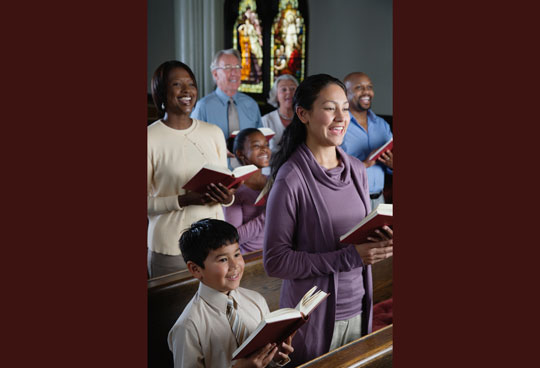
It’s fascinating to note just how integral music and singing are to the world of spectator sports. Whether it is baseball, football, hockey, or basketball, sports fans (especially at the collegiate level) often support their teams by singing and chanting. As long as music and singing are present, there’s hope for your team. When the singing stops, you know your team is in trouble. And that’s when the grumbling begins. “Why’d they leave him in the game so long? His arm is obviously tired.” “I never liked this quarterback anyway!” “Oh c’mon!” When the singing stops, it’s a sure sign that hope has evaporated, and when hope evaporates, cynicism—characterized by grumbling or murmuring—takes over.
This relationship between music, singing, and hope (sans sports!) is captured in Scripture when the Jewish people were led from slavery in Egypt to freedom. The first thing they did upon witnessing the destruction of Pharaoh’s army was to sing: “I will sing to the LORD, for he has triumphed gloriously; horse and rider he has thrown into the sea.” (Exodus 15:1) Just three verses later, however, the singing stops and the grumbling begins as the people grow hot, tired, and thirsty. The grumbling worsens as, a few months into their journey, the people complain, “If only we had died by the hand of the LORD in the land of Egypt, when we sat by the fleshpots and ate our fill of bread; for you have brought us out into this wilderness to kill this whole assembly with hunger.” (Ex 16:3)
Grumbling in difficult situations is human nature. However, Moses’ response to the people is striking: “Your grumbling is not against us, but against the LORD.” (Ex 16:8) While grumbling may seem harmless, in reality, it masks the real question of, “Is the LORD among or not?” (Ex 17:7) The more we occupy ourselves with grumbling, the less time and energy we have to proclaim the Good News that God is in our midst.
For that very reason, it is important to recognize the importance of singing as an expression of our faith. A faith-filled Church must be a Church that is singing! I propose that every parish gathering, meeting, and especially every catechetical session include singing, whether it be a hymn, a chant, or just a refrain. Music and singing are frequently alluded to in Scripture as an important expression of faith. Over a dozen Psalms encourage us to “sing to the Lord.” Jesus and the Apostles sang at the Last Supper before Jesus experienced his agony in the garden. (Matthew 26:30) St. Paul, along with his companion Silas, sang songs while in prison (Acts 16:25), and he later encouraged the Ephesians to address one another “in psalms and hymns and spiritual songs, singing and making melody to the Lord with all your heart.” (Eph 5:19) He also encouraged the Colossians to do likewise: “Sing gratefully to God from your hearts in psalms, hymns, and spiritual songs.” (Col 3:16)
Without song, we are like the people of Israel in exile, a people without hope who could not sing songs to their captors (Psalm 137). It is this kind of hopelessness that once led Friedrich Nietzsche to say, “The world no longer believes because believers no longer sing.”
Are there things to complain and grumble about? Of course! However, faith and hope are the adamant refusal to believe that the world cannot be a better place. Whenever followers of Jesus gather, before we can be sucked into the temptation to grumble, we should raise our voices in song and unleash the hope that is at the very core of the Gospel message. St. Teresa of Ávila said that we need to let the presence of God “settle into your bones, and allow your soul the freedom to sing, dance, praise, and love.” If God is in our midst, we should be singing. And if we are singing, perhaps we will be reminded that God is in our midst and we won’t be so quick to grumble. And if we aren’t grumbling, perhaps others will recognize that God is in our midst. And perhaps then we can become a more faith-filled Church!




This article was perfect timing. I am a choir director and at the end of Mass yesterday a parishioner approached me regarding this exact subject. She normally in the first few pews but yesterday her and husband sat at the back of the church. She said that no one singing around her. As like at many parishes those that sing during Mass usually sit at the front of the church and since my choir is near the altar and I can hear their beautiful voices. I am now aware that I need to find a way to encourage those in the back of the church to lift of their voices. Thank you for your article, Catherine Rodarte
You’re welcome, Catherine, and thank you for keeping God’s people singing!
Singing is a primary means for the body to worship.
How true, Christian